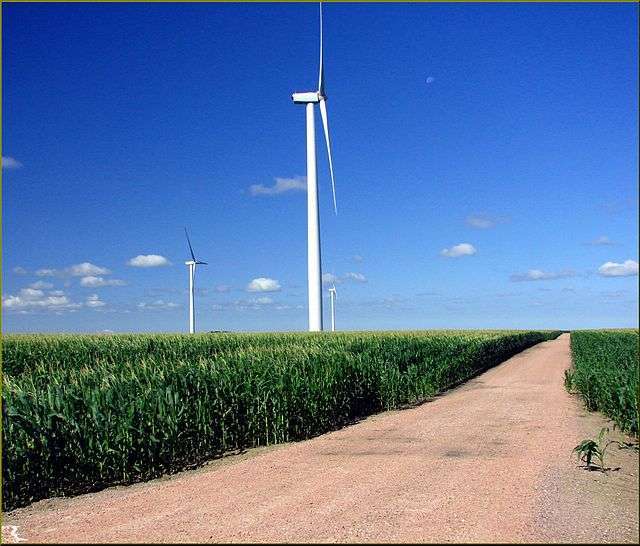Wind turbines in corn field in Minnesota. Photo credit: Don Graham, Creative Commons
We learned about a recently-passed Minnesota state bill mandating “100% clean energy” from a recent interview published by Evergreen Action. While we applaud the real progress embodied in certain aspects of this legislation, we also see numerous flaws, and we implore Minnesota legislators and the communities they represent to go further in future amendments to this plan.
We are happy to see detailed, step-by-step goals to reach a 100% carbon-free electricity sector by 2040. The legislators interviewed, as well as the wording of the legislation itself, make it clear that everyone involved feels confident that these goals can be achieved. This type of careful, detailed planning can serve as a model for other state and federal legislation.
We appreciate the prioritization of energy infrastructure construction and remodel plans that prefer local workers. Although the bill does not use explicit “just transition” language, it does encourage efforts to increase diversity, union organizing, and good wages, and insists that whenever possible, new projects should be sited next to closed projects and that fossil fuel workers should be retrained and re-employed.
We support the inclusion of language that prioritizes assessment of impacts in environmental justice communities. We also support specific goals of 50% of total electricity production with wind power by 2030, and 10% with solar by 2030. We value the bill’s advocacy for small-scale distributed solar electricity systems (i.e. rooftop solar), although we think it should be much more ambitious, as these community-scale investments are the most beneficial to EJ communities.
We are disappointed to see the inclusion of numerous false solutions as so-called “clean energy.” Specifically:
- Hydropower, which has devastating impacts on rivers and watersheds, even at small scales;
- Biomass energy, including incineration of sewage and landfill gasses, household trash, construction waste, agricultural byproducts, trees and other vegetation, because the incinerator industry’s “carbon-neutral” claims are complete nonsense;
- Green hydrogen, which sounds great but is not truly viable, as it represents less than 1% of hydrogen fuel production worldwide. It is notable that nuclear power is not mentioned in this bill – we fear this may leave the door open for so-called “pink hydrogen,” or hydrogen fuel derived from nuclear power, a risky and dangerous option.
The bill supports “renewable energy credits” (i.e. dirty energy producers can temporarily avoid meeting their pollution limits by investing in cleaner alternatives and falsely claiming that to equal less emissions). And it directs the Energy Commission to set up carbon credit trading mechanisms. This is the biggest false solution of all, because carbon trading ultimately allows corporations to continue polluting while paying for the privilege of claiming “negative emissions” on a spreadsheet, misleading the public about the pollution that still exists. Also, as the legislation only sets limits for the state of Minnesota, polluters may find it all too easy to purchase carbon credits in other states or countries and postpone making the changes necessary to meet 2040 goals.
The Just Transition Alliance cautions everyone celebrating this landmark legislation to pay close attention to these details. Please don’t count your chickens before they hatch, and be sure to push your representatives to continue improving this legislation to cut out the false solutions and further strengthen advocacy for the self-determination of local community and workers.

